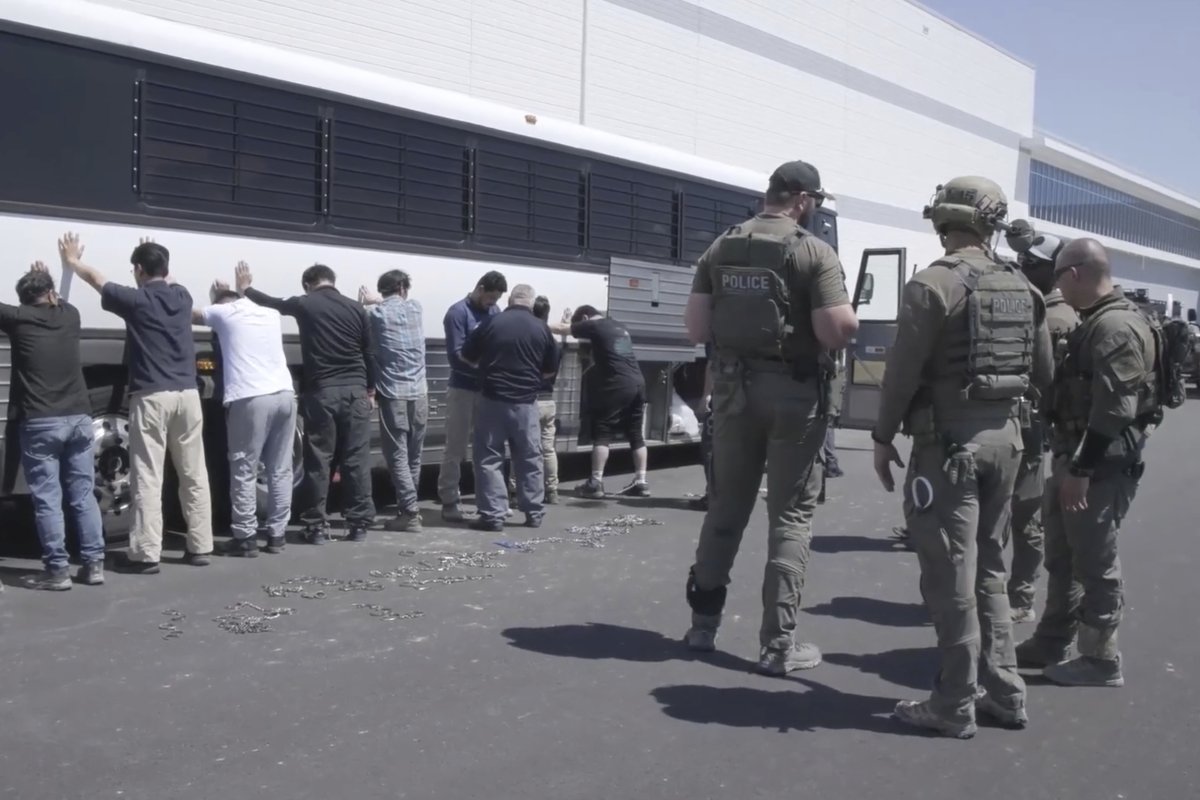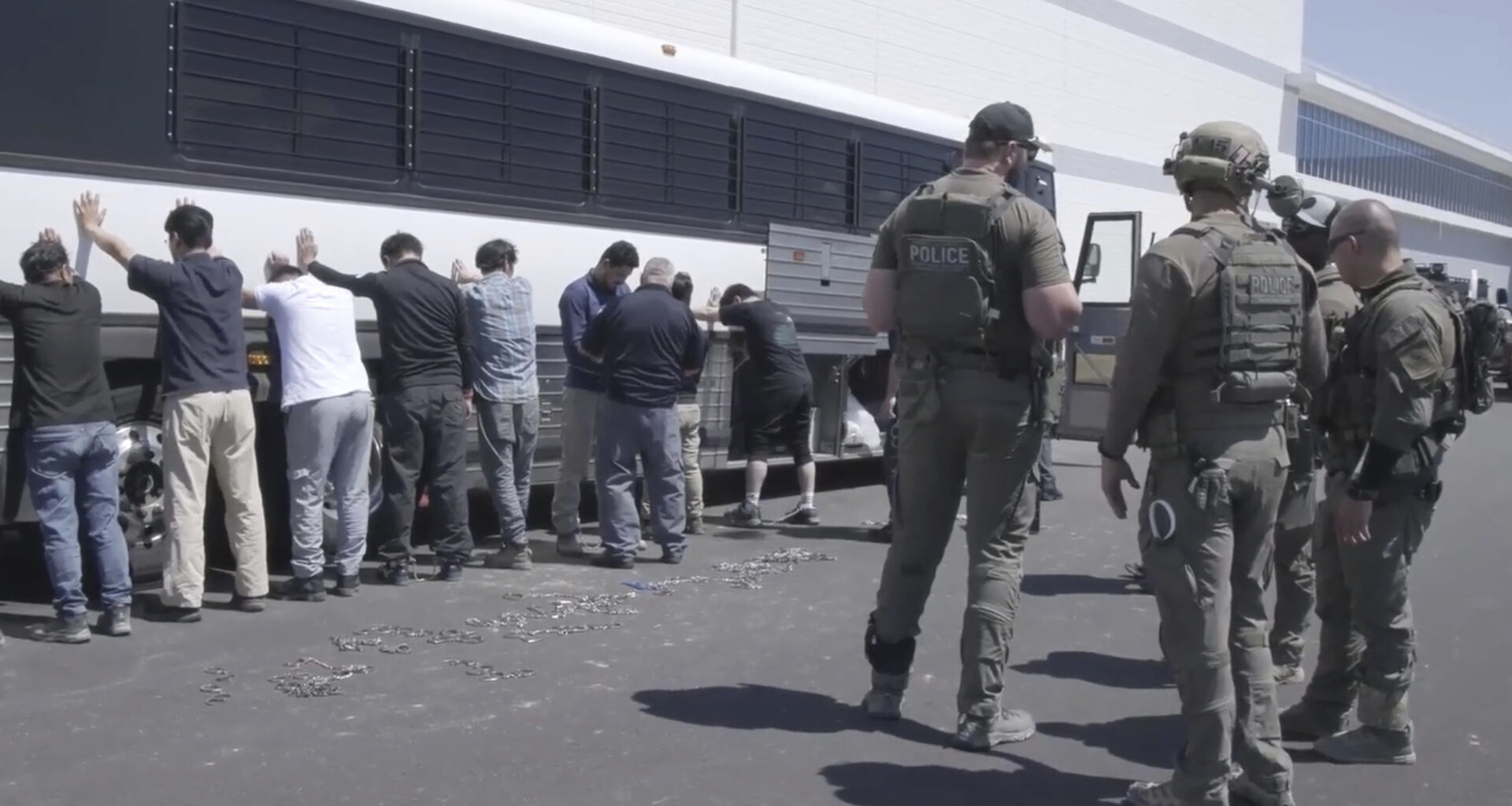Anger has erupted in South Korea after U.S. immigration agents detained more than 300 of its nationals in a raid at a Hyundai–LG electric vehicle battery plant in Georgia last week.
Newsweek has contacted the White House, the South Korean Embassy in Washington, D.C., and the Department of Homeland Security for comment via email.
Why It Matters
The arrests have raised doubts in South Korea about whether Washington treats its ally with the same respect it demands. The controversy comes as the two governments wrestle with trade frictions, new U.S. tariffs on Korean steel and auto parts, and Seoul’s recent pledges to expand investment in the United States.
The countries also maintain a decades-old alliance that has been central to Washington’s military posture in the Asia-Pacific. Seoul hosts more than 28,000 American troops and is a top U.S. trade and investment partner.

Video image released by U.S. Immigration and Customs Enforcement showing agents rounding up South Korean employees at a Hyundai Motor Group factory in Ellabell, Georgia, on September 4.
Video image released by U.S. Immigration and Customs Enforcement showing agents rounding up South Korean employees at a Hyundai Motor Group factory in Ellabell, Georgia, on September 4.
U.S. Immigration and Customs Enforcement via Associated Press
What To Know
U.S. Immigration and Customs Enforcement agents detained 475 people at the plant in Ellabell, Georgia, on Thursday in the largest operation in the agency’s history.
More than 300 of those detained were South Korean nationals, according to Seoul’s Foreign Ministry.
Scenes of South Korean workers being led away in chains has triggered outrage at home.
According to a Realmeter survey of 508 South Korean adults conducted on Monday, 59.2 percent said they were disappointed by the raids, viewing them as “excessive,” while 30.7 percent said they were an “inevitable” part of immigration policy.
Seoul’s response was immediate. “We will not let our guard down until we have our people safely back home,” Kang Hoon-sik, the chief of staff for South Korean President Lee Jae Myung, said during a meeting of senior officials, per The New York Times.
Officials confirmed that a chartered plane would be dispatched once administrative steps were complete.
Analysts have raised concerns that the incident could have a lasting effect on bilateral ties and on Trump’s hopes for luring more international investment to revitalize U.S. manufacturing.
Sean King, a senior vice president at Park Strategies, told Newsweek: “U.S. laws must be enforced. But this Georgia incident will give foreign companies fits and cause for real concern as their governments try to meet President Trump’s demands for overseas investment in the United States.”
Others warn that the fallout could extend beyond trade, affecting perceptions of U.S. reliability as an ally at a time of heightened tensions between South Korea and the nuclear-armed North.
The raid “will do lasting damage to America’s credibility,” John Delury, a senior fellow at the Asia Society think tank, told Bloomberg. “How can a government that treats Koreans this way be relied upon as an ‘ironclad’ ally in a crisis?”
ICE has also faced criticism in the U.S. over its sweeping raids, which began shortly after Trump returned to office. Critics have cited instances of racial profiling, excessive use of force, and the detention of U.S. citizens and legal residents.
What People Are Saying
U.S. President Donald Trump wrote on Truth Social on Sunday: “Your Investments are welcome, and we encourage you to LEGALLY bring your very smart people, with great technical talent, to build world class products, and we will make it quickly and legally possible for you to do so. What we ask in return is that you hire and train American workers.”
Hyundai said in a news release on September 5: “Hyundai is committed to full compliance with all laws and regulations in every market where we operate. This includes employment verification requirements and immigration laws.”
What Happens Next
Seoul’s Foreign Ministry said arrangements had been made to fly its nationals home on a chartered Boeing 747 once procedures were complete.
